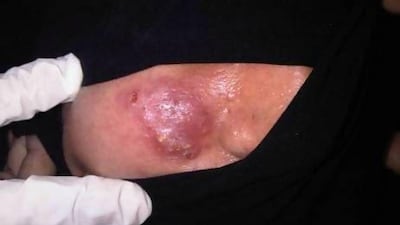ABU DHABI // Rogue operators are visiting patients' homes to carry out cosmetic procedures using illegal and dangerous products such as counterfeit Botox and dermal fillers.
Victims have been left with serious medical complications, many have scars and some are risking their lives, doctors warn.
"Everything is fake - from the people doing the work themselves to the injectables they are using," said Dr Jeehan Abdul Qadir, executive chairman of the American Academy of Cosmetic Surgery Hospital. "All these products are not real; they're copies."
The warnings come after three expatriate women of Arab and Asian origin were found to be offering such services in people's homes. Two have been arrested and the third is believed to have fled the country
"We started receiving complaints from dermatologists across the country and as soon as we received the information we communicated it to the police," said Dr Amin Al Amiri, a senior official at the Ministry of Health.
"These women were not healthcare professionals, they were performing illegal procedures and using products not licensed in the UAE."
Dr Ibrahim Galadari, professor of dermatology at the school of medicine in UAE University, was among those who contacted the ministry when he began receiving complaints at his clinic in Dubai. About 30 of his patients were victims, most Emirati.
The victims were contacted on their mobile phones through calls or text messages. Those who responded received a visit at home and were injected with materials of an "unknown source", Dr Galadari said.
"Some of them were hyaluronic acid, but not manufactured properly," he said. "Some were bought as full gallons, as though they are cooking something in the kitchen, and then they fill up the syringe."
Hyaluronic acid can be used as a dermal filler.
Dr Galadari saw patients with serious complications, including infection, pain and swelling, to the extent that some had to be admitted to hospital.
"Some of these complications are easy to treat with antibiotics, but some need surgery to evacuate all these materials from the tissue," he said. "And of course when they are done with surgery the scars will be there and it will never go back to normal."
Victims were injected in the face, back and lower legs and were charged as much as Dh800. The market rate for facial dermal fillers can range from Dh1,000 to D2,500 depending on the product. Doctors do not believe the victims were motivated by cost, but rather privacy and lack of education.
"Women here are usually shy to come to the clinic; they prefer to have procedures done at home," Dr Galadari said.
"Sometimes they're having Botox parties, where a week or two before a wedding they are inviting other ladies and they bring someone like one of these women to inject them with Botox or fillers.
"Even if this person is licensed, it is away from medical ethics to inject someone outside a clinic."
Experts say the problem is not isolated: they see cases of patients receiving counterfeit fillers and Botox injections all too often. Dr Afif Kanj, a specialist plastic surgeon at CosmeSurge, comes across three to four a month.
"What I've noticed is that it comes in seasons," he said. "Somebody will come from outside and suddenly you have a number of complications."
Cases involving injections in larger areas of the body, such as the breasts and buttocks, are more common, Dr Kanj said.
"Women resort to cheap products because they can be very expensive in the clinics and can reach Dh30,000," he said. "In most cases they regret it. The problem gets more serious when a permanent filler is used. A permanent filler means a permanent problem."
Some of these products can be fatal if inappropriate doses are administered.
"The problem isn't only the product, it's the person performing the procedure," said Dr Max Sawaf, medical director of CosmeSurge. "Some of them aren't qualified and some mix their products with other substances to save money."
Authorities say they are doing their best to clamp down on the problem, which they say is not unique to the UAE.
"We hear that people are going and knocking on people's doors offering them cheap services and our advice as with any medical procedure is to stay away from these individuals," said Dr Layla Al Marzouqi of Dubai Health Authority.
"All of this must be done at a licensed and specialised facility. You need a sterilised environment and to be prepared in case of an emergency. Doing this outside can be extremely hazardous to your health."
Patients who knowingly choose to use such services also compromise their rights. Medical malpractice laws apply in all but three instances: when there is a known complication of a procedure, if the patient does not follow the doctor's orders, or if the procedure took place outside a licensed facility.

